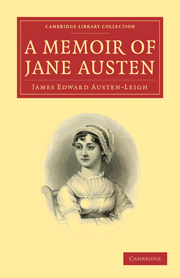Summary
IT is not the object of these memoirs to attempt a criticism on Jane Austen's novels. Those particulars only have been noticed which could be illustrated by the circumstances of her own life; but I now desire to offer a few observations on them, and especially on one point, on which my age renders me a competent witness—the fidelity with which they represent the opinions and manners of the class of society in which the author lived early in this century. They do this the more faithfully on account of the very deficiency with which they have been sometimes charged—namely, that they make no attempt to raise the standard of human life, but merely represent it as it was. They certainly were not written to support any theory or inculcate any particular moral, except indeed the great moral which is to be equally gathered from an observation of the course of actual life—namely, the superiority of high over low principles, and of greatness over littleness of mind. These writings are like photographs, in which no feature is softened; no ideal expression is introduced, all is the unadorned reflection of the natural object; and the value of such a faithful likeness must increase as time gradually works more and more changes in the face of society itself. A remarkable instance of this is to be found in her portraiture of the clergy.
- Type
- Chapter
- Information
- A Memoir of Jane Austen , pp. 196 - 205Publisher: Cambridge University PressPrint publication year: 2009First published in: 1870

